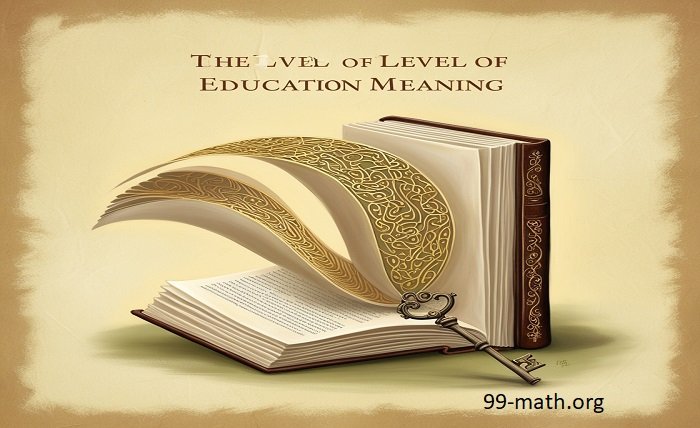Introduction
Success in both the personal and professional spheres is frequently attributed to education. It gives people the abilities, know-how, and skills needed to handle different facets of life. Recognizing the many educational levels facilitates the understanding of the structure of educational systems and their role in the general development of society. Every level of education meaning, from basic learning to advanced degrees, has a distinct function and influence. This article will walk you through the significance and meaning of every educational level, examining how they affect society and careers.
Early Childhood Education
Definition and Extent
Early childhood education, or ECE, covers the years between birth and around eight years of age. Preschool, kindergarten, and early primary education are all included. level of education meaning places a strong emphasis on children’s cognitive, social, emotional, and physical development in order to address their whole development.
Goals and Advantages
Establishing a solid foundation for lifetime learning and growth is the main goal of early childhood education. It seeks to develop a love of learning, improve social skills, and lay the groundwork for future academic achievement. High-quality early childhood level of education meaning has been linked to enhanced social and academic performance as well as a higher chance of obtaining further education, according to research.
Primary Education
Summary
Beginning at age six or seven, primary education usually spans the first six to eight years of official instruction. It covers foundational courses like science, math, reading, and writing with a focus on core abilities.
Goals and Importance
Giving children a solid foundation in reading, writing, and numeracy as well as a comprehensive understanding of a range of subjects is the aim of elementary education. It also seeks to impart social values, accountability, and discipline. The foundation for both personal growth and subsequent academic endeavors is primary level of education meaning.
Secondary Education
Phases and Structure
Secondary level of education meaning is split into two phases: lower secondary, which is often middle school, and upper secondary, which is high school. Secondary education often comes after primary schooling. The ages of 12 to 18 are typically included in this stage.
Intentions and Results
Deeper and more specialized knowledge in disciplines like physics, math, social studies, and the humanities is the main goal of secondary level of education meaning. It places a strong emphasis on advanced skills, critical thinking, and problem-solving as it gets pupils ready for college or the workforce. It is frequently necessary to successfully complete secondary education in order to be admitted to universities or the workforce.
Post-Secondary Education
Types and Definition
All forms of education beyond high school are categorized as post-secondary level of education meaning. It includes a wide range of establishments, including community colleges, universities, colleges, and vocational schools. Undergraduate and graduate programs are offered at this level.
Importance and Routes
Opportunities for higher study and specialization in a variety of subjects are offered via post-secondary level of education meaning. Associate’s, bachelor’s, and advanced programs including master’s and doctorate degrees are all included. For specialized knowledge, personal development, and career advancement, this level of education is essential.
Undergraduate Education
Summary
The initial level of post-secondary education is called undergraduate education, and it leads to associate’s or bachelor’s degrees. Before concentrating on a particular major, it usually entails a wide range of disciplines and general level of education meaning requirements.
Goals and Advantages
Undergraduate level of education meaning‘s main objectives are to give students a thorough understanding of the subject they have selected as well as to help them strengthen their analytical and critical thinking abilities. It provides a basis for lifetime learning and gets pupils ready for advanced coursework or professional vocations.
Graduate Education
Categories and Levels
level of education meaning‘s and doctorate programs are included in graduate education, which comes after completing an undergraduate degree. It entails in-depth research and study in a particular topic.
Goal and Effect
The objectives of graduate education are to undertake original research, build specialized abilities, and enhance understanding in a particular field. It frequently results in jobs in academia, research, or upper-level professional positions. Graduates from these programs go on to become leaders or experts in their businesses, and they also contribute to improvements in their disciplines.
Vocational and Technical Education
Definition and Extent
The emphasis of vocational and technical level of education meaning is on specialized trades or technical skills required for particular jobs. It is intended to provide people with transferable, employable skills so they may start working right away.
Significance and Utilization
In domains like engineering, healthcare, computer technology, and the arts, vocational and technical level of education meaning offers practical instruction and certification. It is crucial for bridging the skills gap in the labor market and advancing careers across a range of industries.
Conclusion
Recognizing the structure of education systems and their effects on the development of individuals and societies requires an understanding of educational levels. From setting the groundwork in early childhood level of education meaning to offering specialized information and skills in graduate school, each level has a distinct function. We acquire the skills necessary for social progress, professional progression, and personal development as we proceed through the educational system. Accepting lifelong learning also guarantees that we will always be changing and adapting.
FAQ
What is the significance of early childhood education?
Foundational education for early childhood development sets the stage for lifetime learning and growth. It enhances future academic success and personal well-being by supporting cognitive, social, and emotional growth.
How does secondary education differ from primary education?
By providing more specific information and abilities, secondary education expands on the groundwork established in basic school. It stresses critical thinking and problem-solving skills and gets pupils ready for college or career training.

